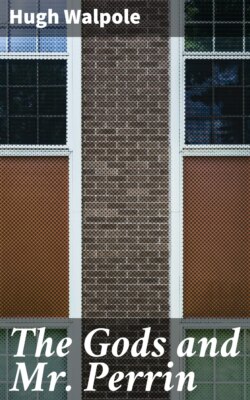Читать книгу The Gods and Mr. Perrin - Hugh Walpole - Страница 11
На сайте Литреса книга снята с продажи.
IV.
ОглавлениеTable of Contents
A word, finally, about the surrounding country.
It becomes, perhaps, at once most definitely presented if you take the Brown Hill as the center, and Pendragon to the right along the coast, and Truro inland to the left—both at an equal distance—as the farthest boundaries.
Between Truro and Moffatt's there is a ridge of hill—undulating, gently, vaguely shaped, with its cool brown colors melting into the blue or gray of the sky as dim clouds melt into one another.
The Brown Hill itself rises sharply, steeply, straight from the sea, with the little village—Chattock—at its feet, curling with its steep, cobbled street up the incline. Halfway down the hill there is a wood—the Brown Wood—and it hangs with all its feathery trees in friendly, eager fashion over the little white-stoned and yellow-sanded cove (so tiny and so perfect in its shape and color that it almost audibly cries out not to be touched). There is a little part of the wood where the trees part and you may sit, in a kind of magical wonder, right over the gray carpet of the sea, hearing what the wood, with its creaking and bending and rustling, is saying to the water and what the water, with its slipping and hissing and singing, is saying to the wood. Of the two towns Pendragon has become, from the invasion of the Vandals, modern and monotonous. It had, not so long ago, a cove on its outskirts—that was the whole of Cornwall in a tiny space; now there is a row of modern villas, red-roofed and wooden-paled. Traill, in his visits there, was concerned with the chief house there—The Flutes, owned by a certain Sir Henry Trojan, whose son, Robin Trojan, had been, although senior, a friend at Cambridge. The house was beautiful both in its position and in the spirit of its owner, and Traill snatched what moments he could to visit it and to snatch a respite there.
Had he known, it became in the back of his mind a contrast with the “lobster red” and the stone corridors of Moffatt's, so that he took its wide, high rooms and its shining, ordered garden with an added sense of richness. Had he realized how soon its dignity and peace stood to him for an “escape,” he would have realized also his growing protest against his voluntary imprisonment. He went over also on occasions to Truro—because he liked the walk over the hill, because he liked certain quaintnesses in the market, in the sharp cobbles of Lemon Street, in the higher breezes of Kenwyn, because, above all, he liked the dark quiet and solemnity of the Cathedral.
The point about both Pendragon and Truro is that it was the kind of life that he was leading at Moffatt's—the sides of it that are soon to be given you in detail—that led him to notice these places. Contrast drove him to a sudden opening of his eyes—contrast and Isabel Desart. He was growing so very quickly.
In letters to his mother he spoke of a splendid little wood where one could sit and watch the sea for hours if there was only time; of the funny old hill, all brown, with the white road curling up it; of calling at The Flutes, and “Sir Henry Trojan and Lady Trojan being most awfully kind,” and the house being quite beautiful, but very little about the people of the school, and during those first few weeks nothing at all about Isabel Desart.
It was not until Mrs. Comber gave her dinner-party that the preliminaries could be said to be over.
